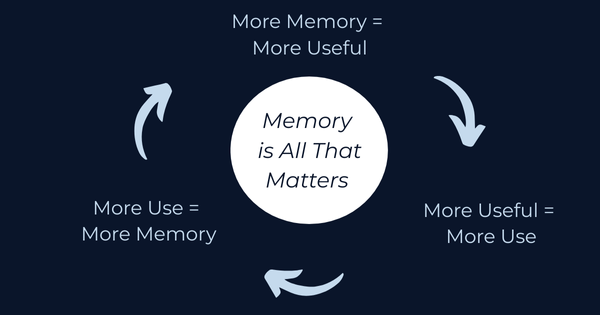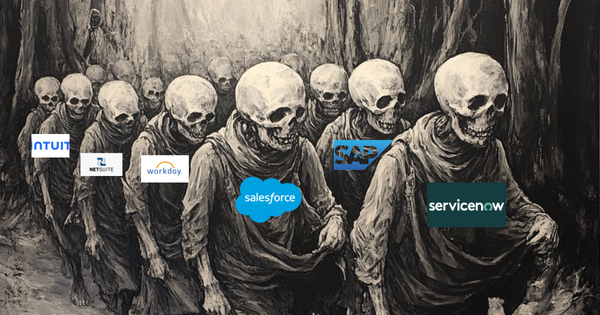The Future of Content

AI is going to radically change content creation.
If you’re a content creator, here’s how to know what’s coming.
So you can not only survive this shift, but thrive.
New technologies change things in two ways.
1 - They allow us to do things more efficiently.
We could light our houses before electricity.
Electricity made lighting our houses much more efficient.
2 - They allow us to do things that were impossible without the new technology.
There was no way to watch TV before electricity.
Electricity made watching TV possible.
The same will be true with AI
1 - AI will allow content creators to be more efficient.
2- AI will allow us to do things that were previously not possible.
Here’s how.
5 Things AI Makes More Efficient
Think about the work you are already doing.
Where could additional intelligence make you more efficient?
The answer is everywhere.
Here are some examples to get you started:
1 - Translation
Prior to AI you could translate your content into other languages.
But it was costly and time consuming.
Now you can translate your content into dozens of languages with the click of a button.
For free.
2 - Reformatting and Repurposing
Prior to AI you could turn your article into an image, YouTube, TikTok, and Instagram reel.
You could also turn it into a Facebook, LinkedIn, and X post.
You could even do a podcast on the same topic.
But this would take a full day or longer.
AI can now do all this in less than an hour.
And soon it will be even faster.
3 - Research
Prior to AI you could read all the major research papers on a topic.
But it would take weeks, and you’d probably forget most of it.
Now you can feed those same research papers to AI and ask it for:
- Summaries
- Simpler explanations
- Additional details on topics mentioned in the paper
- Counter arguments
- Advice on which papers to dig deeper on for your topic
- Where you may have holes in your thinking.
And you can do this in an hour or 2, instead of a couple of weeks.
Your AI system can also store it all for you, so you don’t forget.
4- Editing
Prior to AI you could have an editor edit your content.
But it’s time consuming and expensive.
AI can now edit your articles in seconds.
For free.
5 - Transcription
Prior to AI you could have someone transcribe your interviews and phone calls.
But it was time consuming and expensive.
Now AI can transcribe any audio with the click of a button.
For free.
10 Things AI will make possible, that were previously impossible
It’s harder to predict the television than it is the lightbulb.
And we really don’t need to.
We just need to keep our eyes open for things that seem a little crazy at first, but that our audiences are loving.
Here are some things to watch out for:
1 - Human, AI Collaborative Content Creation
Prior to AI it was not possible to have an intelligent non-human collaborate with you on your content.
AI makes this possible.
You can even collaborate with many different AI models, to get many different ideas and perspectives.
The end result is content that was created not by a human or an AI, but by both.
This will allow individual creators to gain much greater scale.
And when combined with the efficiency gains enabled by AI, will allow small teams to compete with the biggest media brands in the business.
2 - Branded, Interactive AI Avatars
Prior to AI it was not possible to have an interactive AI avatar represent your media brand.
AI makes this possible.
This allows independent creators to build a media brand that is not directly tied to them personally.
And it allows publishers to build their brand around an avatar that they fully own and control, vs. humans which they do not.
It is likely a more reputable way to represent media that is created by both Humans and AI.
And it’s most certainly a more reputable way to represent content that was created mostly or fully by AI.
3 - AI Only Creators
Prior to AI it was not possible for anyone but a human to autonomously create content.
AI makes this possible.
This will result in a new category of media I’ll refer to as embodied AI.
Embodied AI’s will be like avatars but with a key difference.
They will be launched and molded by humans initially, but over time will become more and more autonomous and self evolving.
4 - Content that converses.
Prior to AI it was impossible to have a conversation with content.
AI makes this possible.
This could be via chat interfaces, or Avatars which are trained on the article and the source material it was created from.
5 - Content that autonomously evolves.
Prior to AI it was not possible for content to learn and autonomously evolve itself.
AI will make this possible.
AI will leverage the data that publishers currently use to manually optimize their articles.
It will analyze this data and automatically evolve the content for maximum performance.
Content will also evolve itself based on the conversations it is having with the audience.
This is an example of how these ideas build on each other.
6 - Context Aware Content (Personalization at Scale)
Prior to AI it was not possible to personalize every piece of content to everyone individually.
At least not at any level of scale.
AI will make this possible.
For example, a travel blogger’s article on things to do in France will automatically adjust based on the time of year and the reader’s budget and tastes.
The goal of the content will be the same.
How that goal is reached will be 100% personalized to the individual consuming it.
7 - Generative Interactive Branching Content
Prior to AI it was possible to give people different branches to travel through a piece of content.
But those branches were fixed and defined for the audience ahead of time.
AI will allow generative interactive branching content, which creates a 100% unique experience based on the user, the context, and their preferences.
8 - Multimodal Synchronized Content
Prior to AI it was not possible to synchronize content across multiple platforms.
AI will make this possible.
Write and article and have AI turn it into a video, podcast, and image.
Update the article and it automatically updates the video, podcast, and image.
9 - Memory Aware Content
Prior to AI content had no memory.
AI makes it possible to give content memory.
This will take personalized content to the next level.
As AI remembers your previous interactions with its content, and includes this context to evolve all aspects of your experience.
10 - Reality Augmented Content
Prior to AI it was not possible for content to see and hear.
AI makes this possible.
This will allow content to be created that includes real world, and real time inputs from your environment.
5 ways content creators should adapt
1 - Embrace the AI revolution
The tractor of our time has just been invented.
Those who do not leverage it will have the same fate as those who continued to farm by hand.
And this time it is digital, so it’s happening at lightening speed.
2 - Leverage AI to produce more, without sacrificing quality.
Every time you do something ask yourself:
How can AI help me do this more efficiently?
You can even ask AI to help you come up with these ideas.
Learn by trying.
If you fail on your first attempt, try again.
AI is like any tool. It takes time and experimentation to learn.
But unlike other tools, AI improves along with you.
3 - Monitor Emerging Possibilities
Prior to AI, content innovation was largely incremental.
Now, entirely new content formats and experiences are becoming possible.
You don't need to be the first to adopt every new innovation.
But you should:
- Watch for new developments
- See how audiences respond to new formats
- Quickly adapt when new approaches gain traction
4 - Build an AI-Forward Network
It’s easy to find content creators that don’t like AI.
But they are not going to help you when the tractor comes for your job.
The next 10 years are about integrating AI into everything.
The job market is going to be terrible for those that spend their time complaining about AI.
And fantastic for those who embrace it.
5 - Be an owner.
AI is making it easier than ever to build your own media company.
And the surest way to benefit from the AI revolution is to build and own an asset that benefits from it.
But you don’t have to start a company in order to be an owner.
You can still own the “means of production” for high quality content.
Think about it this way.
If you work for someone else, they are paying you because of the knowledge and experience you possess.
The same will be true in our AI driven future.
But the difference this time is you can leverage AI to build and own your own AI system.
An AI system that is custom built to produce unique, differentiated, and valuable content.
A digital equivalent of your physical brain.
But the key is you have to own it.
That’s what I’m working to help you do, and you can get started right now for free.
Thanks for reading.
Dave





